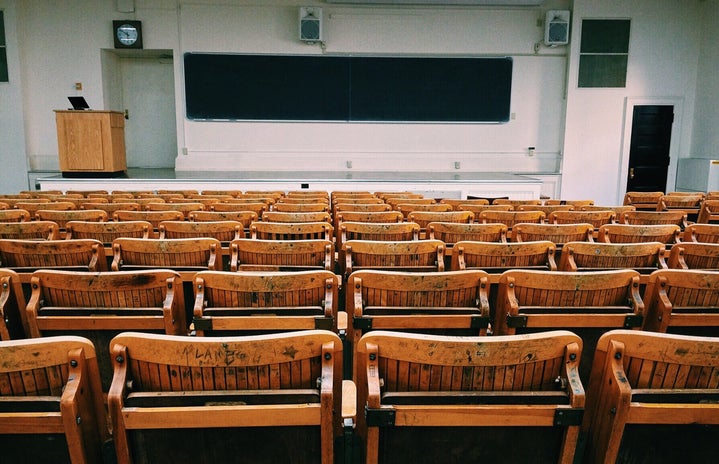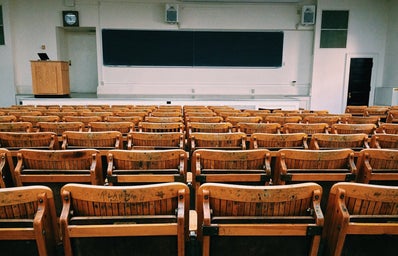Recently, I heard that my discussion sections for my classes would be cancelled and the rest of the essays and quizzes we had planned for the semester would not be graded for the next two weeks, with the possibility of extending this hiatus to the rest of the semester. Suddenly, I realized how much our TAs did for our classes and was surprised to learn that they were on strike. As students, we have heard many different reactions to the grad student’s strikes — from the administrators, faculty, our own peers, and the grad students themselves. I think it’s important to provide some general information about the strike, a personal account from my instructor, and ways to get involved.
My Space in my Spanish Class
Professor Tamara Hache teaches a Spanish Advanced Language through Content course called Mapping Nation-States: Spatial Imaginations in Modern Latin America. We have a very small class of only nine students and the professor. I am very grateful for this tight knit space where I get to practice having conversations with my classmates and professor in Spanish as we discuss the readings. We also have the opportunity to learn about each other’s experiences and connect through this beautiful language that is Spanish. Recently, we’ve been having some discussion in English about a very important issue, and that is the graduate student strike. Professor Hache has so generously taken some time in and after class to explain to us what we should be aware of.
What is Going On
I think it is fit to start with a few excerpts from an email Professor Hache sent to my class and to others in order to educate us about the strike.
“The Graduate Workers of Columbia University (UAW-GWC Local 2110) have been in negotiations with Columbia for the past two years to reach a fair contract for graduate student workers. Though we have moved closer to a tentative agreement, most of the critical issues remain unsolved. Among others, these issues include Columbia’s refusal to increase graduate student compensation, refusal to provide a funding extension in light of the effects of COVID-19 on research schedules, no dental and vision coverage in our insurance plan, and their refusal to allow independent recourses for sexual harassment and discrimination.”
The graduate strike website elaborates on some points the graduate students hope to negotiate on. The first bargaining session since the strike began on March 15 did not provide anything in the way of significant updates. The university gave one proposal that didn’t change their position, despite their significant moves in the last two bargaining sessions, on both economic and non-economic issues. Below is a summary of what their side attempted to raise at the table.
Non-Discrimination and Harassment: Graduate students emphasized that the current process only issues recommendations while punishment is left at the sole discretion of the university. This includes procedural rules that prevent claims from both being investigated or appealed. Graduate student workers hope to solve this by having a third-party arbitration.
Health Benefits: Graduate students are trying to push for dentaland vision care, including a premium matching and a larger health fund.
Fees and Tuition Waivers: Graduate students emphasized the importance of health service fee waivers for masters student workers. Student workers must go through the university for access to healthcare, and waiving the Health Service Fee could be a great first step in making healthcare more accessible for workers in masters programs.
Compensation: Graduate students believe 2% wage increases are not acceptable. They have attempted to discuss compensation data from NYU showing that they are paid ~5% more at a comparable workload.
However, these points have not been taken into consideration. Professor Hache explains:
“Given the deadlocked state of negotiations, 96% of the Bargaining Committee has voted to authorize a strike with the goal of moving this contract to completion. Long story short: the administration refused to grant us basic and vital rights as workers, and we are prepared to take action. Our working conditions have not improved over the past year, during which Columbia cut funding to departments by 25%, hurting graduate students who are dependent on stipends and funding to cover their basic living expenses. And as you all know, Columbia’s response to the COVID-19 pandemic has been far from satisfactory.”
Professor Hache tells us things are a little more complicated:
“Graduate students who, like me, work as instructors, TAs, or RAs, are in a double bind, because we are dependent upon Columbia for both our academic status and our employment, and therefore also our health insurance, which has unfortunately remained subpar through the pandemic. Many grad students, like me, also live in University Apartment Housing, which means that the University is also our landlord. International students depend on the University for our visas. This means that for many of us, Columbia is our only safety net, and thus their actions have an impact on every aspect of our lives.”
I am shocked and very upset that the administration has not met the basic needs that Graduate students are asking for. Actually, it is upsetting that they even need to ask for things like health care in the first place!
Important Reminders and Resources
-
It is crucial that no graduate worker self-reports because it would force the university to engage in the illegal practice of not paying workers who are not withholding labor. It is also extremely important that you do not answer any emails from the administration asking for information about the courses that you’re taking.
-
Linked here is an Instagram post about ways to help
-
Detailed and up-to-date information about each of the demands and the bargaining sessions can be found here.
An Interview with my Instructor
1. Starting off with the positive, what have you loved about being at Columbia (as a student, as an instructor)?
I think what I love the most about Columbia is the people! I’m really grateful to be able to share my PhD experience with students in my department (and other departments too!) who are incredibly generous and kind, as well as brilliant. I’ve made such good friendships here and I’m lucky to have a support system while navigating this experience, which can be challenging at times! Also, I’m very happy with my teaching program: the fact that we’re given the opportunity to design our own syllabus is great, and I’m really enjoying it — which brings me to my most favorite thing about Columbia, which is sharing and learning with my students. I’m grateful for all the wonderful people that I got to share a classroom with (both in person and now online!) and I’m humbled by their commitment, kindness, and intelligence. It’s truly a privilege!
2. What challenges have you faced? Is there something unique about being an international student?
The biggest challenge so far I think has been the lack of support from the administration. Being a PhD student can be isolating at times, and I feel like we need more resources to create a community within our departments. I’m personally very lucky to have a wonderful advisor, but I also know how rare that is, unfortunately. Regarding my experience as an international student, I do feel that we’re more vulnerable in certain ways: our visa depends on our status as full-time students (and so does our healthcare, for example), so anything that threatens that is potentially very harmful (like what happened with ICE last year and the requirement to take classes in-person). As international students, we depend on Columbia for everything –and that can be a problem.
3. Why do you believe the strike is important? What do you hope will be achieved?
I believe the strike is important because Columbia needs to address our demands. Our working conditions have not improved over the past year, during which Columbia cut funding to departments by 25%, hurting graduate students who are dependent on stipends and funding to cover our basic living expenses. Columbia is refusing to grant us basic and vital rights as workers while calling our efforts “heroic”. Another critical issue is Columbia’s refusal to allow independent recourses for cases of harassment and discrimination. I know this issue resonates on a personal level for many student workers, and the latest proposal at the bargaining table –although a move in the right direction– still not enough. I sincerely hope that Columbia takes this chance to do what’s right.
4. What do you want people to understand about everything that is going on?
I want people to understand the power of collective action. We’ve become used to Columbia getting away with too much for too long, and it’s time to take action! We’ve received an overwhelming amount of support from fellow students, undergraduate students, other unions, and even faculty. Ultimately, our working conditions are Columbia students’ learning conditions –and that’s what matters the most to me as an instructor.
Ways to Get Involved
1. You can donate to a GoFundMe Campaign set up by a group of undergraduate students to be used in case Columbia decides to dock graduate workers’ pay: https://www.gofundme.com/f/solidarity-with-columbia-academic-student-workers.
2. You can write and sign to express your support: https://actionnetwork.org/letters/columbia-agree-to-a-fair-contract-now
3. You can call the Dean of the Graduate School of Arts and Sciences, Carlos Alonso: https://www.surveymonkey.com/r/9JDC2P6
4. You can sign up for the in-person picket line: https://docs.google.com/forms/d/e/1FAIpQLScrQ8EICwDnxTvy9nMzYtK0Jfp-Q1rvQMgF6U1fZWC0IaHNnw/viewform
5. Or the virtual picket line: https://docs.google.com/forms/d/1wHqb_EHBsRXFOTHSluQ2DW3ixphmT6cuJgZPhw6QSS4/viewform?edit_requested=true
6. Here is a Padlet where you can anonymously express your support: https://padlet.com/mml2224/2jemii0ik7c7oab1
To Put Things in Perspective
Professor Hache shared some very shocking numbers with us.
“I want to share that, post-tax, I make roughly $26K a year from Columbia over a 12-month period, which is expected to cover the cost of basic necessities such as housing and food (for reference, undergraduate tuition is roughly $58K per year). Of course, daily life does not solely consist of housing and food, both of which are already far from affordable in NYC. Many graduate students are paying off loans or other bills, others are attempting to feed many mouths and not solely their own. A living wage for a single adult with no children is about $45K per year. Columbia University President Lee Bollinger, as of 2018, earned $4.6 million, the highest compensation of any president in the Ivy League.”
There are no words to describe how wrong this is, especially in light of how graduate students’ demands have time and time again been blocked and ignored. It is the same story, even in college — the rich get richer, and the rest are ignored and minimized. This needs to change, WE need to put pressure on the administration.
An Update
As of April 3rd, the The Bargaining Committee has decided to accept the University’s offer of mediation with a strike pause. Starting April 5th, graduate students will be returning to work. Their website goes into detail:
“Given the timing and status of bargaining, we believe that we have the best chance of winning a fair agreement this semester if we try mediation as a pathway while reserving the right to resume the strike later in the semester. We all know the University does not want further disruption, and we can evaluate in a week or two if mediation is getting us towards a strong contract. It is critical that we use this time to grow our power to take action, especially if we need to put more pressure on Columbia due to insufficient progress in mediation.”
This strike has impacted many undergraduate students as well, especially as it gets closer to finals. Having the support of our TA’s, professors, and RAs is very important. But we also need to make sure we support them too.
Just as the Bargaining Committee states, this is a pause, which means the fight is not over.
A Message of Thanks and Hope
My professor has made this second semester of COVID a lot brighter, and every bit of ease makes a world of difference. She is someone who cares about her students and I see it in the ways we have conversations in class. She is also very passionate about her work, and I see it about the way she is so excited to talk about great Argentinian authors like Domingo Faustino Sarmiento. And she is a hero, (despite the administration using the term in a condescending way) for passionately and gracefully fighting for better conditions for graduate students.


